Many written trees
- Eurozine Review
15/2018
‘Revista Crítica’ marks forty years of interdisciplinary publishing; ‘Host’ talks about organized corruption and interference in the arts; ‘Index on Censorship’ profiles global journalism in the age of unreason; ‘New Eastern Europe’ explores the ambiguities of 1918; ‘Akadeemia’ appeals for concord and constitutionalism; ‘Esprit’ contemplates a Europe without Christianity; and ‘Springerin’ reflects on paradoxes of progress.
Revista Crítica de Ciências Sociais (Portugal) special issue 2018
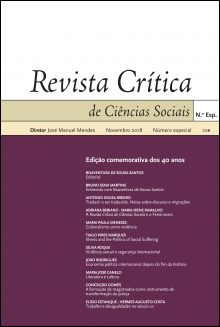
In a special fortieth anniversary issue, Portuguese journal Revista Crítica traces its roots back to the University of Coimbra in the late 1970s. The publication emerged alongside the university’s Centre for Social Studies in the wake of the Revolution of 25 April 1974, when Portugal began the uneasy transition from dictatorship to democracy. ‘We had a huge field stretching out before us,’ writes the Centre’s founding director Boaventura de Sousa Santos, ‘and the aim was to plant as many written trees as possible, with no disciplinary monocultures or agro-toxins of bibliographic reputation.’ This creative, interdisciplinary approach to the social sciences remains one of the journal’s hallmarks, forty years on.
Journals history: Adriana Bebiano and Maria Irene Ramalho chart forty years of feminism in the pages of Revista Crítica, from women’s suffrage and the fight for social and sexual equality up to the #MeToo movement. Elsewhere, Maria José Canelo argues that the journal’s emphasis on literary and cultural studies over the years has been ‘instrumental in the identification of forms, subjectivities and voices of resistance’. The literary representation and analysis of previously marginalized positions, Canelo writes, has proved key to forging more flexible social roles and prefiguring lasting social change.
Translation and migration: Linguistic fluency is being weaponized within the context of the migrant crisis, writes former Revista Crítica editor António Sousa Ribeiro. Language tests function as ‘postmodern border guards’, he argues. ‘In the collective imagination, this requirement seems to somehow offer a sense of security, a way of controlling the fear of heterogeneity; the national language, as sign of unity, provides the illusion of a clearly defined border.’ Instead of linguistic assimilation, host nations should encourage translation and intercultural dialogue, in order to promote a ‘relationship of reciprocity’.
1989: João Rodrigues addresses the economic legacy of 1989, arguing that the crisis of socialism in the 1980s left capitalism without a challenger and with no incentive for progressive reform. This lead ‘the socioeconomic system to become divorced from democracy’ and resurrected the spectre of populism. But Rodrigues claims there are benefits to modern populist movements, in that they threaten the status quo and open up new realms of possibility, thereby ‘improving the chances of collective self-determination and working forms of international cooperation’.
More articles from Revista Crítica in Eurozine; Revista Crítica’s website
Host (Czech Republic) 9/2018
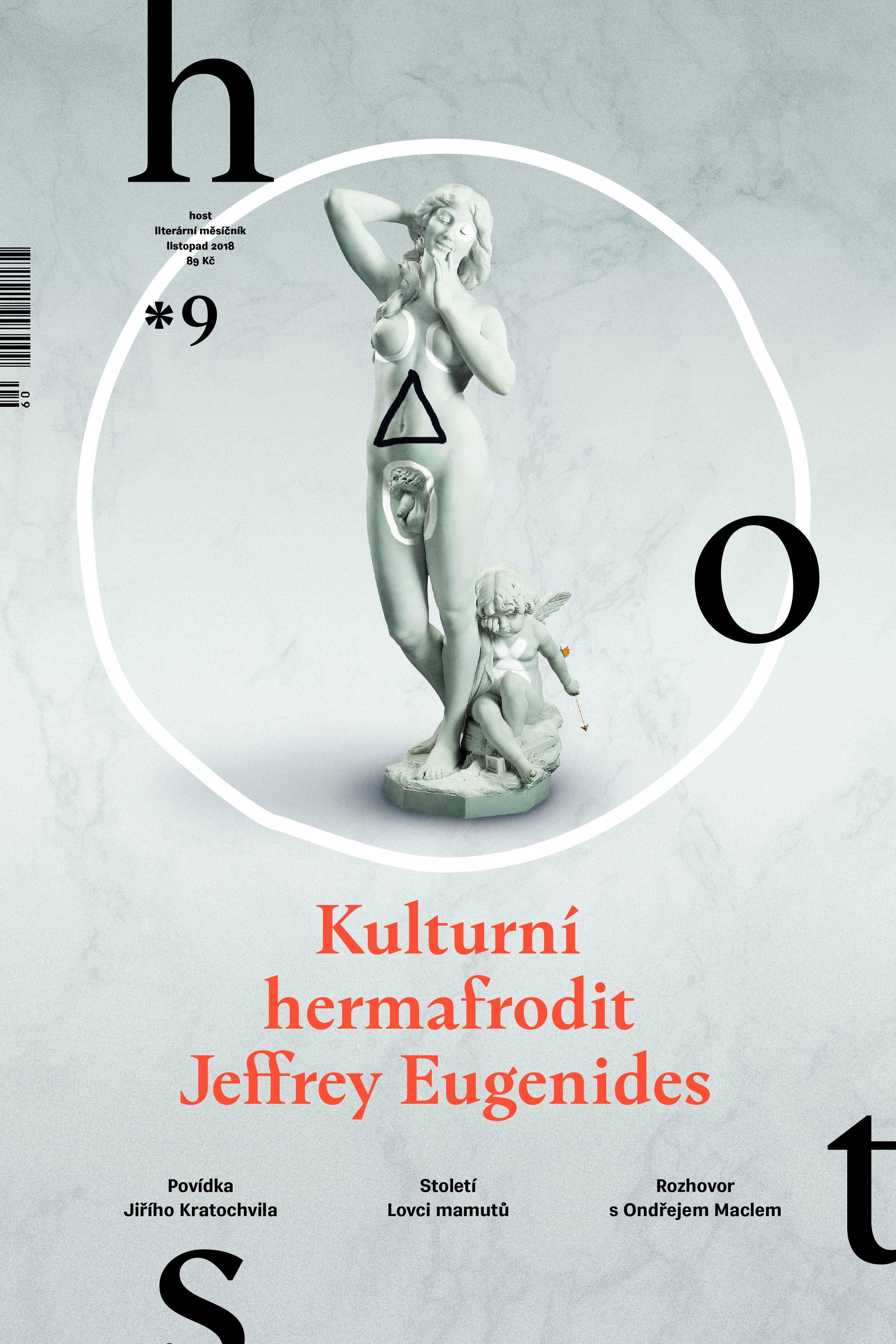
Host interviews the investigative journalist Petra Holcová, founder of the Czech Centre for Investigative Journalism and the only Czech on the international team of journalists who worked on the Panama Papers. Looking back on her career, Holcová contends that it is not enough to expose corrupt practices and money laundering – it is important to explain their impact on real lives and to show that these are not victimless crimes. She has worked with fellow journalists from Armenia and Macedonia on exposing nationals of these countries who have used the Czech Republic to launder money and has come to understand that investigative reporting means looking beyond local scandals: ‘Organized crime and corruption have become globalized. And so we, journalists, also have to globalize.’
As a close associate of the Slovak journalist Jan Kúciak, who earlier this year was murdered along with his fiancée Martina Kušnírová, Holcová was in great danger and had to go into hiding for a while. Kúciak’s murder, she says, ‘was intended as a very visible gesture: people in Slovakia were meant to notice, it was supposed to work as a general deterrent. If they had just wanted to get rid of a journalist who was a nuisance, they could have done it in a much less conspicuous way.’ But Holcová refuses to be intimidated: ‘It is our job to send a signal to politicians: we are looking at you, we are watching what you’re doing. And by doing so we force them to take responsibility for their decisions.’
Censorship: Miroslav Balaštík is alarmed by two recent instances of government interference in cultural affairs. In May, an official of the Brno city council threatened to withdraw funding from a theatre festival after the Croatian production of Oliver Frljič’s play Our Violence and Your Violence was deemed to offend religious sensibilities. And in July, a member of the Czech Radio Board objected to a reading of the Czech translation of Alan Hollinghurst’s The Line of Beauty. Corruption and foul language are tolerated at the top, writes Balaštík, while the arts are under attack. ‘The primitive way in which our democratic institutions have tried to impose on [the arts] ethical criteria and norms of taste represents a serious interference in artistic autonomy.’
More articles from Host in Eurozine; Host’s website
Index on Censorship (UK) 3/2018
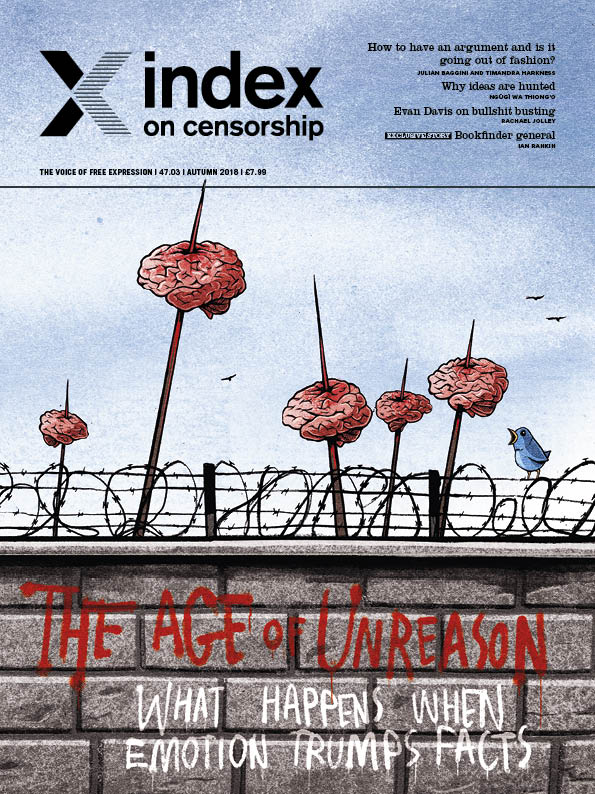
Examining the role of emotions and primal instincts in public sentiment, Index on Censorship interviews a neuroscientist about internet commenters, gives practical advice on how to debate angry people, and details a variety of ways in which journalists from around the globe are tackling the age of unreason.
Documentary: Stephen Woodman examines the sudden popularity of documentaries in Mexico, showcasing instances when these have successfully impacted on legislation and criminal investigations. ‘The documentary boom is not limited to Mexico. A 2016 survey by the Centre for Media and Social Impact at the American University, in Washington DC, found that two-thirds of documentary makers felt strongly that this was a “golden era” for the genre … Documentaries play a special role in Mexico, where they are often the last defence against lies and impunity.’
Wellness: Wana Udobang explores how aggressively marketed wellness products have become a gentrified version of traditional medicine. ‘Wellness has long been big in many parts of the world, and Nigeria has not been left out. Perhaps this is because it’s a country where many still cannot afford proper healthcare and where a general distrust of medical institutions and poor medical institutions prevails … Wellness offers an alluring substitute, often supported by anecdotal evidence and word-of-mouth. It has created an opportunity for many to take their healthcare into their own hands.’
Self-censorship: In the run-up to the 2019 elections, Indian prime minister Narendra Modi is using an army of internet trolls to incite hatred and issue direct threats against critical reporters. Independent media are curbed, even if not fully silenced, writes John Lloyd. Despite being subject to obvious political pressure, domestic media enjoy very high levels of trust: ‘Cases likely to draw more government criticism, such as the lynching of Muslims and Dalits, are seldom reported in full. Most reporting on these subjects serves only to blame the opposition parties, or anyone but the prime minister.’
More articles from Index on Censorship in Eurozine; Index on Censorship’s website
New Eastern Europe (Poland) 6/2018
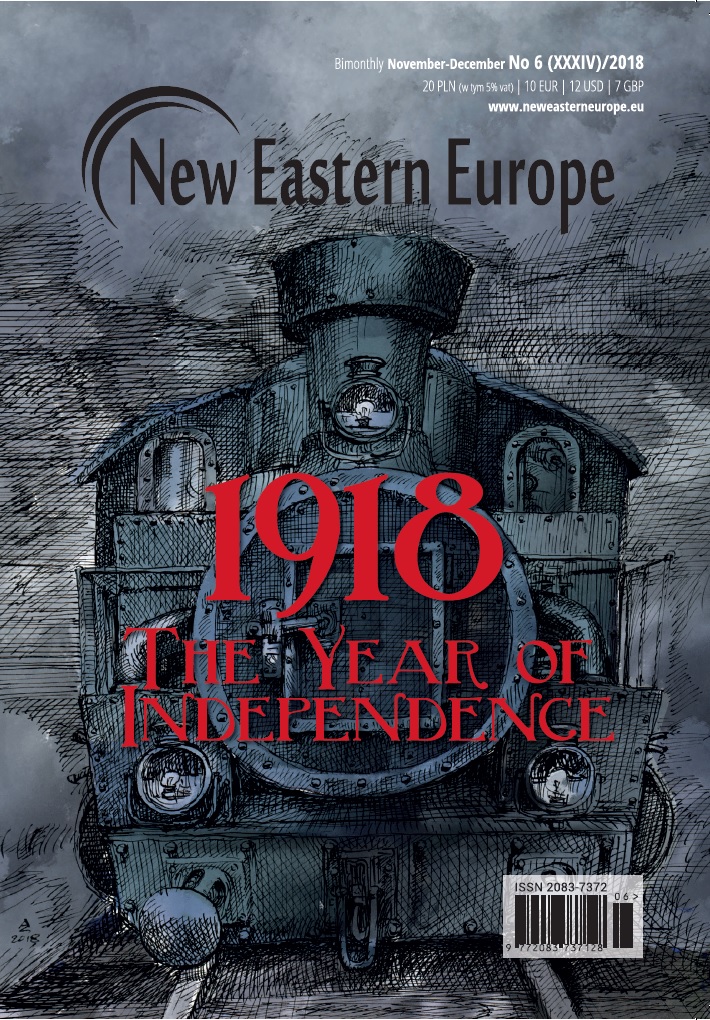
In eastern Europe, 1918 is remembered not only as the end of the war, but also as the year of national liberation. Poland, Czechoslovakia, Estonia, Latvia, Lithuania, Belarus, Ukraine, Georgia, Armenia and Azerbaijan all took advantage of the chaos of the period to declare their independence. For many, however, it was short lived, as the Bolsheviks pushed their way into the remnants of the Russian Empire, write the editors of New Eastern Europe.
Poland: Adam Balcer outlines Polish foreign policy under Józef Piłsudski, the ‘father’ of Polish independence. Piłsudski’s aim was to recreate the former Polish-Lithuanian Commonwealth, liberate the non-Russian nations, and establish an ‘Intermarium’ or alliance between the newly independent states from the Baltic to the Black Sea. The Riga Peace Treaty, signed in March 1921, in which Poland recognized the new Soviet republics of Belarus and Ukraine, signaled the failure of all three objectives. And yet, explains Balcer:
‘The Treaty of Riga, together with the Treaty of Versailles, established an international order in Europe which allowed several nations (Poland, the Baltic countries, Finland, parts of Ukraine) to remain outside Soviet rule for almost twenty years. This situation contributed significantly to the strengthening of their national identities. Thanks to that strength they were able to survive Soviet aggression or domination. Today it helps them to counter the neo-imperial policy of Russia.’
Ukraine: Memories of the Polish-Ukrainian war for Lviv and Galicia in 1918 ‘deflect our attention away from more significant events’, argues Yaroslav Hrytsak. These took place further East, in Kyiv, where the revolutionary uprising against the aristocratic regime gave way in 1919 to the Bolshevik campaign against Ukraine. Had the war in Galicia not diverted troops from Kyiv, the war against Russia may have been won in 1919, Hrytsak speculates. Instead, the Bolsheviks made it all the way to the Vistula in Warsaw, before finally being repelled by a Polish-Ukrainian alliance in 1920.
Monuments: Arnold Bartetzky writes on the war memorials erected across central Europe after 1918. Intended to help unify the new nations, ‘in the predominantly multi-ethnic and religiously heterogeneous states, the identity models connected with remembrance were exclusive rather than integrative’.
Also: Russia has become an important hub for cryptocurrency. To the concern of investors, the authorities are trying to bring the market under state control – not least because they are beginning to recognize crypto’s potential to bypass western sanctions. Agnieszka Pikulicka-Wilczewska reports.
More articles from New Eastern Europe in Eurozine; New Eastern Europe’s website
Akadeemia (Estonia) 11/2018
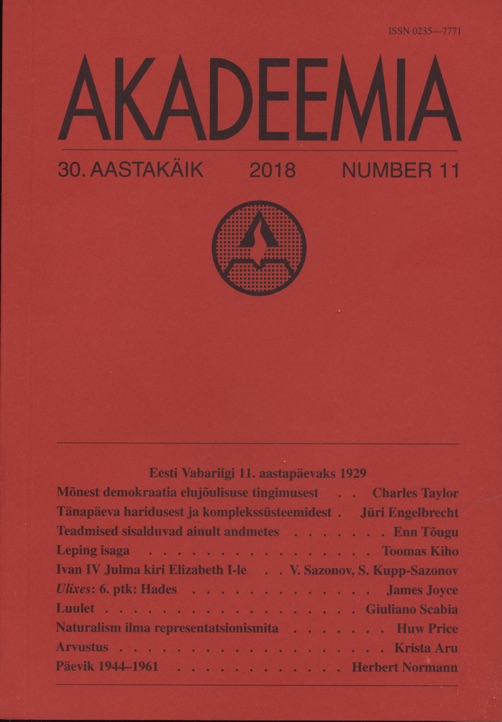
Akadeemia continues its series on this year’s centenary of Estonian independence by reprinting newspaper articles first published in 1919 on the occasion of the nation’s 11thanniversary. One article concludes with an appeal: ‘We cannot rest on our laurels but must give the whole structure of our state a cleaner and healthier core … What kind of example do the people need now? Namely, the current catchword: concord. Tolerance and concord are the most urgently needed qualities now. All the troubles and difficulties can be overcome if there is concord and willingness to understand one another.’
Democracy: In similar vein, Akadeemia re-publishes Charles Taylor’s article ‘Some conditions of a viable democracy’, written in 1991 for Transit and first published in English in Slovakian journal Kritika & Kontext. Taylor asks what exactly ‘is the nature of the relations in which people stand when they are common citizens of a democratic regime?’ Neither the ‘economic theory of democracy’ nor the Rousseauian volonté générale provides a satisfactory answer. Instead, there is a middle way, in which the constitution ‘is seen and cherished as a common good, because it is seen as the common repository and bulwark of the dignity of all the participants’.
Knowledge: ‘Somebody’s or something’s knowledge is the information useful (or necessary) for them’, argues Enn Tougu. Applied to artificial intelligence, this definition means that ‘if information [contained in the form of data] can be used for solving problems that require intellect, this information should be considered knowledge.’
Complexity: Contemporary education should include knowledge about the world’s complexity, argues Jüri Engelbrecht. Many simple examples exist that illustrate complex systems, such as the butterfly effect, birds in flight, or the emergence of chaotic motion. Educators should include these ‘primers in complexity’ to help the next generation manage future challenges.
More articles from Akadeemia in Eurozine; Akadeemia’s website
Esprit (France) 11/2018
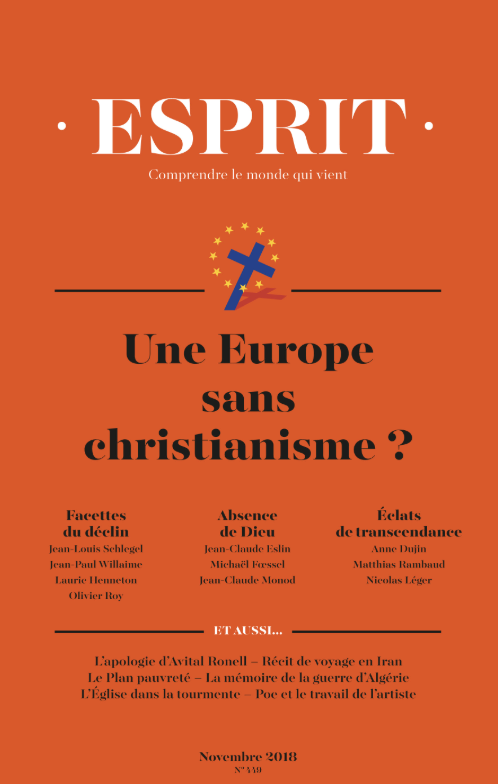
Introducing a dossier entitled ‘A Europe without Christianity?’ Jean-Louis Schlegel writes in Esprit: ‘Let us reassure those who might be worried: this is not – yet – the case. Believers and religious communities remain diversified and alive –although are more numerous in some places than others – and are stimulated by migratory de-territorialization and the growth of “multicultural” societies.’
Secularization and the law: ‘The lawcourts’ management of religion in general and of Islam in particular is reshaping the whole religious field in Europe,’ writes Olivier Roy. He demonstrates how court decisions impact on the relations between European society and religions, mainly Christianity and Islam. Although not all religion cases involve Islam, religion is treated by the courts as a “crisis” subject due to the focus on Islam in society. Citing examples of laws on religious signs in France, or a recent law forbidding ritual slaughter in Denmark, Roy argues not that courts in Europe are Islamophobic, but that they ‘negate religions and contribute to the secularism of European societies’.
Absent Gods: Islamic terrorism can be interpreted as ‘a form of nihilism: a limitless resentment toward a world without God, argues Michael Fœssel. Islamic terrorists cannot bear the absence of their God in a world upon which they seek revenge.’ Both Nietzche and Karl Barth remind us that one should not refer to a ‘return of religion’. Today, we are witnessing ‘more a phenomenon of religious vitalism than a renewal of faith’. Nietzche and Barth invoke God sparingly, and teach us the vanity of religious vitalism, which desires God ‘here and now’.
Paradoxes of secularism: Jean Claude Monod insists on a nuanced understanding of secularization. Exploring Charles Taylor’s ‘Secular Age’ analysis, he argues that the categories of secularism and post-secularism only partially describe religious tendencies in an era of uncertainty.
Algeria: Joël Hubrecht writes on Macron’s recognition in September of the responsibility of the French State in the death of Maurice Audin, a member of the Algerian communist party, in 1957. This is the first time that such an abuse has recognized at the political level. Macron also announced the opening of civil and military archives on disappeared persons during this period. This constitutes a step towards the full recognition of responsibility for abuses committed by the French State during the Algerian war, writes Hubrecht.
More articles from Esprit in Eurozine; Esprit’s website
Springerin (Austria) 4/2018
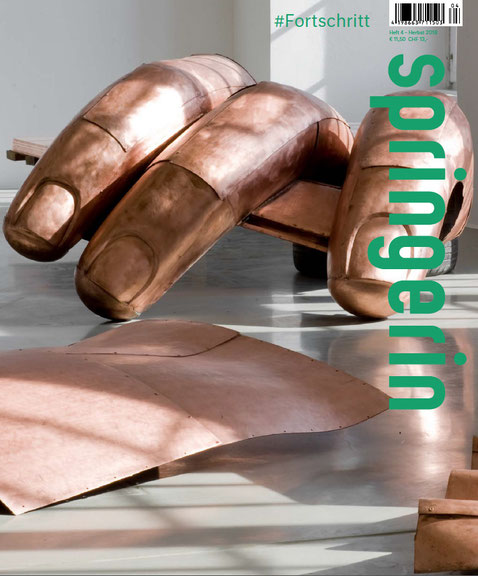
Can contemporary society said to be ‘progressing’ and does the concept of ‘progress’ have any meaning anyway? For a long time, the cultural field has been sceptical of the rationalist tradition with which ideologies of progress are associated, write the editors of Springerin. Yet art is showing a new interest in ‘viable, projective approaches to overcoming the unjust, anti-egalitarian conditions that politics has for a long time been prepared to accept’.
Eco-aesthetics: When it comes to global ecology, progress would appear to be regress – if only such a thing were possible. Yvonne Volkart responds to the dilemma by arguing for the concept of ‘eventful becoming’. ‘From an eco-aesthetic perspective, events take place where, in the connection between specific times, spaces and actors, the unpredictable becomes possible. Techniques of immersion with others and moments of becoming and growth stand in contrast to algorithmically programmed hyper-individualism and non-stop optimization of one’s own materialism.’
Performance: Russian performance art group Chto Delat aims to transpose Kazimir Malevich’s dictum ‘Go and Stop Progress!’ to the present. Oxana Timoveeva explains: ‘Technological developments that are subordinated to the production of value are paradox: we expect technologies to give us more freedom, but what we get is more enslavement and (self-)alienation … We believe that new technologies and new concepts of progress are possible. The problem with technological progress is not that it is bad, but that it has gone awry. We need to stop it, in order to change its course.’
Prog 2.0: ‘Progress can only be conceived politically if we have already made recognizable progress’, writes Diedrich Diederichsen. For a long time, the liberation movements of 1968 and after were seen as complicit in ‘the capture of liberated bodies, senses, sexualities and marginalized life-forms by a neoliberal, post-Fordist capitalism’, he writes. ‘However, during the long setting of the communist sun, the Left actually made progress, in recognizing that the vilified “bourgeois freedoms” were not only worthwhile, but also that at heart they weren’t even so “bourgeois”.’
Also: Krystian Woznicki on cybernetics, crowd management and the pre-emption of the political: predictive policing thwarts the formation of political subjectivity, he argues.
More articles from Springerin in Eurozine; Springerin’s website
The Eurozine Review presents a selection of the latest issues of Eurozine partner journals, summarizing their contents in English as a way of encouraging cultural and political dialogue between national public spheres in Europe. Subscribe here.
Published 27 November 2018
Original in English
Contributed by Eurozine © Eurozine
PDF/PRINTNewsletter
Subscribe to know what’s worth thinking about.



